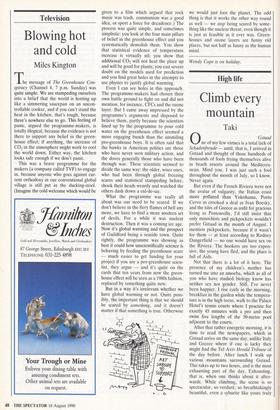Television
Blowing hot
and cold
Miles Kington
The message of The Greenhouse Con- spiracy (Channel 4, 7 p.m. Sunday) was quite simple. We are stampeding ourselves into a belief that the world is hotting up like a simmering saucepan on an uncon- trollable cooker, and if you can't stand the heat in the kitchen, that's tough, because there's nowhere else to go. This feeling of panic, argued the programme-makers, is totally illogical, because the evidence is not there to support any belief in the green- house effect; if anything, the increase of CO2 in the atmosphere might work to cool the world down. Either way, the kitchen looks safe enough if we don't panic.
This was a brave programme for the makers (a company called TVF) to engage in, because anyone who goes against cur- rent orthodoxy in our conventional global village is still put in the ducking-stool. (Imagine the cold welcome which would be given to a film which argued that rock music was trash, communism was a good idea, or sport a force for decadence.) The process was quite simple, and sometimes simplistic: you look at the four main pillars of belief in the greenhouse effect and you systematically demolish them. You show that statistical evidence of temperature increase is virtually nil; you show that additional CO2 will not heat the place up and will be good for plants; you cast severe doubt on the models used for prediction and you find great holes in the attempts to use physics to justify global warming.
Even I can see holes in this approach. The programme-makers had chosen their own battle ground to fight on and did not mention, for instance, CFCs and the ozone layer. But I came away impressed by the programme's arguments and disposed to believe them, partly because the scientists lined up by the 'programme to pour cold water on the greenhouse effect seemed a more engaging bunch than the unsmiling pro-greenhouse boys. It is often said that the hawks in American politics are those who have never seen military action, and the doves generally those who have been through war. These scientists seemed to divide the same way: the older, wiser ones, who had been through global freezing scares and statistical stampeding before, shook their heads wearily and watched the others dash down a cul-de-sac.
What the programme was really all about was our need to be scared. If we don't believe in the fiery flames of hell any more, we have to find a more modern set of devils. For a while it was nuclear destruction. Then it was a coming ice age. Now it's global warming and the prospect of Guildford being a seaside town. Quite rightly, the programme was showing as best it could how unscientifically science is behaving by feeding the greenhouse scare — much easier to get funding for your project if you are a pro-greenhouse scien- tist, they argue — and it's quite on the cards that ten years from now the green- house effect will be seen as a 1980s fashion, replaced by something quite new.
But in a way it's irrelevant whether we have global warming or not. Quite poss- ibly, the important thing is that we should be scared by something, and it doesn't matter if that something is true. Otherwise we would just loot the planet. The odd thing is that it works the other way round as well — we stop being scared by some- thing like the nuclear threat, even though it is just as feasible as it ever was. Green- houses and ozone layers are funny old places, but not half as funny as the human mind.
Wendy Cope is on holiday.


























































 Previous page
Previous page